Critics of former pope are scapegoating him over abuse, says Vatican

Pope Emeritus Benedict XVI gestures at the Munich Airport before his departure to Rome, June 22, 2020. | PHOTO: Sven Hoppe/Pool via REUTERS/File Photo
VATICAN CITY — The Vatican on Wednesday hit back at critics of former Pope Benedict, under scrutiny over his handling of sex abuse in Germany decades ago, accusing them of seeking a scapegoat over what should be a “collective examination” of the Church’s past.
The Vatican waited nearly a week to issue a substantive response following last Thursday’s report on abuse in the Munich archdiocese from 1945 to 2019.
That report said the then-Cardinal Joseph Ratzinger failed to take action against clerics in four cases of alleged abuse when he was the city’s archbishop between 1977-1982.
In a commentary, the Vatican’s editorial director, Andrea Tornielli, strongly defended Benedict’s record from when he left Germany to become the Vatican’s doctrinal chief and later as pope from 2005 to 2013.
“Ratzinger, …as Prefect of the Congregation for the Doctrine of the Faith, had already fought the phenomenon in the last phase of the pontificate of St. John Paul II … and once he became Pope, promulgated very harsh norms against clerical abusers, special laws to combat paedophilia,” Tornielli wrote in the Vatican’s official media.
Article continues after this advertisementPresenting the Church-commissioned report last Thursday, lawyer Martin Pusch said Ratzinger had done nothing against the abuse in four cases and there appeared to be no interest shown in injured parties.
Article continues after this advertisementIn his commentary, Tornielli, who has the current pope’s ear, said reconstructions of long-ago events contained in the Munich report “will help to combat paedophilia in the Church if they are not reduced to the search for easy scapegoats and summary judgements.”
On Monday, Benedict, now 94, infirm and living in the Vatican, acknowledged he had been at a 1980 meeting over a sexual abuse case in Munich, saying he mistakenly told German investigators he was not there.
His private secretary, Archbishop Georg Gaenswein, said Benedict did attend the meeting but the omission “was the result of an oversight in the editing” of an 82-page statement sent earlier to the German investigators.
The lawyers said when they presented the report that the former pope’s earlier insistence that he had not been at the 1980 meeting was contradicted by written records.
Tornielli it was no surprise that the period concerning when Ratzinger was archbishop “monopolized the attention of commentators” on the Munich report.
He said a rush to judgement and scapegoating had to be avoided so that everyone could “contribute to the search for justice in truth and to a collective examination of conscience on the errors of the past.”
Since the report was issued, conservatives have defended the former pope but victims groups and experts said the findings had tarnished the legacy of one of Catholicism’s most renowned theologians.
RELATED STORIES
Former Pope Benedict XVI expresses ‘shock and shame’ at Church abuse
Ex-Pope Benedict under scrutiny in German child abuse probe